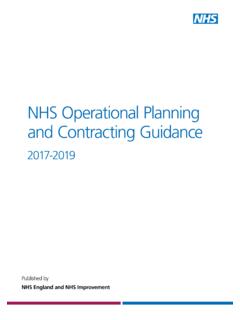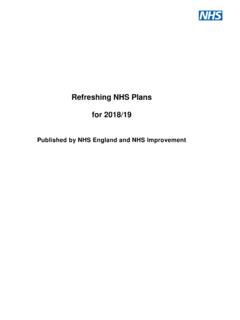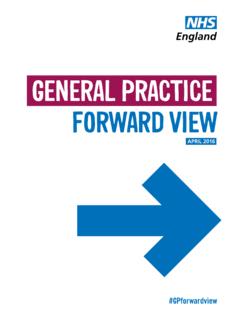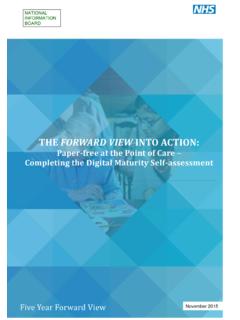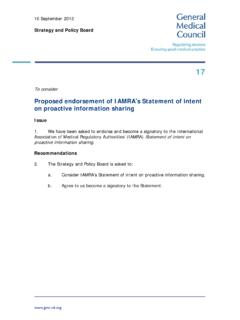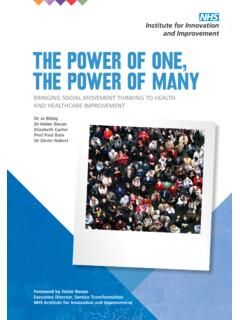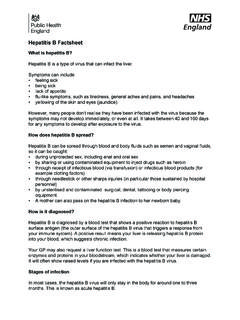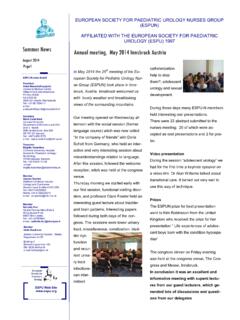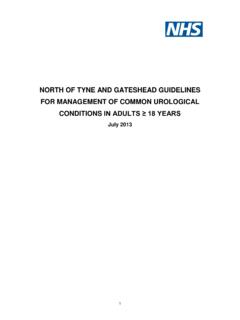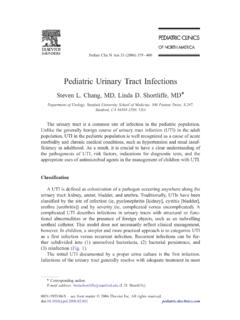Transcription of E03/S/a 2013/14 NHS STANDARD CONTRACT FOR …
1 1 NHS England/ E03/S/a NHS Commissioning Board, 2013 The NHS Commissioning Board is now known as NHS England E03/S/a 2013/14 NHS STANDARD CONTRACT FOR paediatric medicine : RENAL PARTICULARS, SCHEDULE 2 THE SERVICES, A SERVICE SPECIFICATION Service Specification No. E03/S/a Service paediatric medicine : Renal Commissioner Lead Provider Lead Period 12 months Date of Review 1. Population Needs National/local context and evidence base Specialised paediatric renal services provide ca re for a wide variety of conditions. Many children with uncomplica ted general nephrological conditions - simple urinary tract infection or steroid responsive nephrotic syndrome, may be managed by general paediatricians in local hospitals with out reference to a specialist paediatric nephrologist at the specialist renal centre.
2 Some children develop complica tions of common conditions or have rare conditions benefiting from specialist expertise, whilst others require specialist diagnostic and therapeutic procedures including dialysis and transplantation that can only be provided by a sp ecialist renal centre. Children requiring the more complex paediatric nephrology services are treated at the 10 specialist renal centres in England, all of which provide both haemodialysis and peritoneal dialysis. Eight of these centres also provide paediatric renal transplantation. Children with renal disease often have multi-sy stem problems and require co-location with other specialties as detailed in Commissioning Safe and Sustainable Specialised paediatric Services - A framework for critical Inter- dependencies.
3 Individual renal diseases are rare in children. Incidence The incidence varies according to the condition, for example: chronic kidney disease (dialysis and transplant): per million age related population (pmarp) in children pa <16 yrs* (reference 14th UK Renal Registry 2 NHS England/ E03/S/a NHS Commissioning Board, 2013 The NHS Commissioning Board is now known as NHS England report July 2012 acute renal failure (Haemolytic uraemic syndrome): per 100,000 children pa steroid sensitive nephrotic syndrome 2-4/100,000 children pa antenatal hydronephrosis 1/100 live births Prevalence Chronic kidney disease (dialysis and transplant): per million age related population (pmarp) <16yrs* (reference 14th UK Renal Registry report July 2012).)
4 Chronic kidney disease (pre-end stage renal failure) approx. 53 pmarp. This is probably an underestimate. (Formal UK registry not available at present.) Steroid sensitive nephrotic syndrome 16/100,000 children Renal transplantation Approximately 130 per annum ( pa) in the UK Specialist expertise and support from multidisciplinary teams is required to lead the management of these conditions. *Data provided for < 16yrs for prevalence and incidence of chronic kidney disease as registry data for 16-18yr olds currently incomplete due to some 16-18yr olds being managed in adult centres. This will be addressed in due course when the adult and paediatric data sets are merged, enabling more accurate data on this patient group.
5 Evidence of standards of Care Available from the Department of Health - Department of Health(2004) The National Service Framework for Renal Services, Services Part 1 The National Service Framework for Renal Services, Part 2 The National Service Framework for Renal Services: Working for Children and Young People Department of Health (2008) Commissioning Safe and Sustainable Specialised paediatric Services Available from the Renal Association - : Renal Association (2009-2012) The fifth edition of the Renal Association Clinical Practice guidelines (on-line only) Available from the British Association for paediatric Nephrology.
6 BAPN (2007) Haemodialysis clinical practice guidelines for children and adolescents BAPN (2007) Peritoneal dialysis clinical practice guidelines for children and adolescents 3 NHS England/ E03/S/a NHS Commissioning Board, 2013 The NHS Commissioning Board is now known as NHS England BAPN (2010) Helping adolescents and young adults with established renal failure BAPN (2010) - standards for renal biopsy BAPN standards for hypertension post-transplant BAPN (2011) Growth monitoring in children with chronic renal failure BAPN (2011) Improving the STANDARD of care of children with kidney disease through paediatric Nephrology networks.
7 Available in hard copy from BAPN - BAPN (2003) Review of multi-professional paediatric nephrology services in the UK - towards standards and equity of care National Institute for Health and Care Excellence ( NICE) - CG114 Anaemia management in people with chronic kidney disease: February 2011 NICE- CG 54 Urinary tract infection: diagnosis, treatment and long-term management of urinary tract infection in children Available from Royal College of Paediatrics and Child Health (RCPCH) Bringing Networks to Life-An RCPCH guide to Implementing Clinical Networks (March 2012) 2. Scope Aims and objectives of service The aim of the service is to improve both life expectancy and quality of life for children with renal disease by providing optimal specialised care and specifically.
8 To identify children at risk of renal disease to prevent progression of disease where possible to provide appropriate care to those with established renal disease including support from full multidisciplinary teams to ensure support for the physical, psychosocial and emotional needs of the patient and their family to prevent complications of renal disease to provide equity of access to care to provide care as close to home as possible to ensure smooth and managed transition to adult services to support parents and families of children with renal disease as well as the affected child to ensure effective communication between patients.
9 Families and service providers Service description/care pathway The specialised service will provide the lead for nephrology services across the 4 NHS England/ E03/S/a NHS Commissioning Board, 2013 The NHS Commissioning Board is now known as NHS England region. It will provide both inpatient and outpatient care for those with complex renal disease including those requiring dialysis (both acute and chronic) and will provide the support of the multidisciplinary team. This specification will include the following: care within a specialist paediatric renal unit (both inpatient and outpatient)
10 Expert advice from a paediatric nephrologist to other paediatric specialists within a referral centre - paediatric intensive care, oncology, endocrinology, cardiology, urology outreach clinics with the specialist and the general paediatrician in the local hospital expert advice from a paediatric nephrologist to the local hospital s general paediatrician caring for the child or, less commonly, to the GP, by letter, telephone, email or videoconferencing expert advice from non-medical multidisciplinary renal team members to other healthcare providers specialist paediatric renal nurses, dieticians, psychologists, pharmacists etc by letter, telephone, email or videoconferencing visits from members of the multi-disciplinary team to the patient s home and school to provide assessment, training and support to the child, family and other carers.
